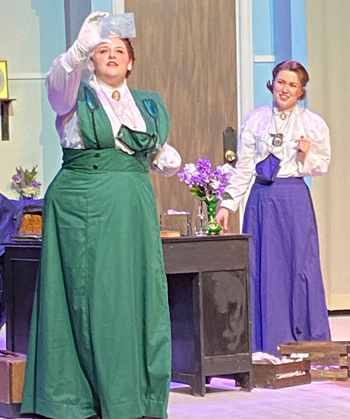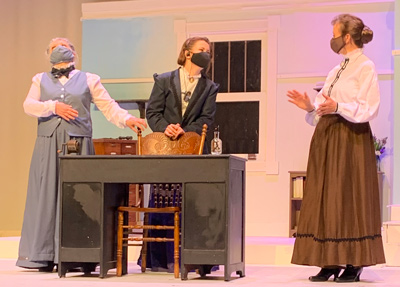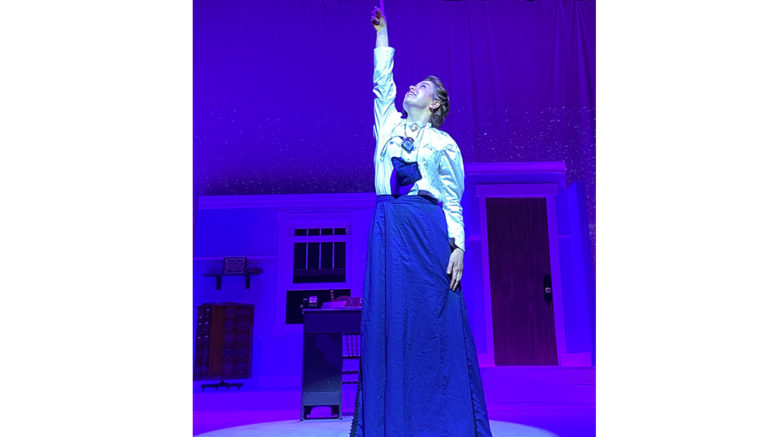By STU CLAMPITT
Main Street Productions, in conjunction with Grand Universe, is currently staging Silent Sky, a play about science and love and women’s struggles in the year 1900. The play runs through May 16 at Westfield Playhouse, 220 N Union St., Westfield.
Silent Sky gives audiences a chance to not only learn about the history of women in science, but also to get some hands-on experience with modern astronomy.

Margaret (Hannah Elizabeth Boswell) looks closely at Henrietta’s (Dani Gibbs) work for the first time. (Photo provided)
According to Director Max McCreary, “Silent Sky is the story of Henrietta Swan Leavitt and the Harvard observatory ‘computers.’”
The term “computer” originally meant “one who computes,” or a person performing mathematical calculations.
In his 1950 paper titled, “Computing Machinery and Intelligence,” Alan Turing described the “human computer” as someone who is “supposed to be following fixed rules; he has no authority to deviate from them in any detail.”
Teams of people, often women from the late nineteenth century onwards, were employed to undertake long and often tedious calculations.
“They were effectively the first recognized female astronomers in the United States,” McCreary said.
McCreary told The Reporter Silent Sky is at its core a love story.
“It is the love story of Henrietta’s relationship with her work, with the night sky, with science, and also with her family and her romantic love interest, Peter Shaw,” McCreary said. “It is a heartwarming play about what it means to be curious.”
One of the foundational themes in the works of playwright Lauren Gunderson is an emphasis on the stories of women in STEM (Science, Technology, Engineering, and Math).

The ladies of the observatory laugh around Henrietta’s workstation. (Susan Hill, Dani Gibbs, Barb Weaver) (Photo provided)
“This was the first one of her works that got big national recognition because of the story it was telling,” McCreary said. “This is about a department of truly brilliant mathematicians without whom Harvard Observatory would never have been able to make the discoveries that it made. We use their data – their research – every single day now in contemporary astronomical sciences. But back in 1900 they were all relegated to a small office building just off the side of the observatory working for $0.25 an hour just to effectively crunch the numbers for the men who were in the other rooms. Despite being in those circumstances, Henrietta Leavitt’s work, her publication – particularly the period luminosity relation – became the document that allowed us to measure the distance to stars. It is literally because of her work that we have a better understand of where Earth is in our galaxy and in relations to everything else that’s in our night sky.”
In addition to the play itself, Grand Universe will have telescopes available outside the playhouse for an introduction to both night and day astronomy.
 “The folks at Grand Universe have just been terrific,” McCreary said. “They are so excited to be partnering with us because they, like I do, just share a love for the night sky, for space and for astronomical science. They will be bringing a special set of telescopes and experts from their center to Westfield Playhouse for experiences that they’ve curated after the show, once it’s dark enough to actually see the sky. For the matinee performances they are even bringing in a special telescope that was built for us to safely look at the Sun.”
“The folks at Grand Universe have just been terrific,” McCreary said. “They are so excited to be partnering with us because they, like I do, just share a love for the night sky, for space and for astronomical science. They will be bringing a special set of telescopes and experts from their center to Westfield Playhouse for experiences that they’ve curated after the show, once it’s dark enough to actually see the sky. For the matinee performances they are even bringing in a special telescope that was built for us to safely look at the Sun.”
No walk-in seating will be available. Reservations will close TWO hours prior to curtain.
The program for this show is digital. You can access it on the Silent Sky tab at westfieldplayhouse.org or by scanning the QR code available in the lobby of the theatre.
You can read the details of the MSP COVID-19 policy online at westfieldplayhouse.org under the “Buy Tickets” link.

